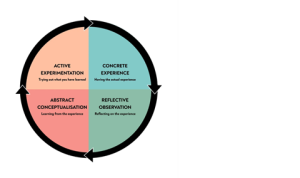Guiding Principles
Chapter 1: Experiential Learning Theory
“Simulation is a powerful learning tool, but like any other teaching and learning method, proper design and implementation require understanding and incorporating of sound educational learning theory and pedagogical practices” (Ross, 2021, Article 15).
It is important to note the difference between learning theory and pedagogy. Learning theory explores how learners acquire and retain knowledge, focusing on the learning process. In contrast, pedagogy refers to the methods and practices by which the teachers teach (Ross, 2021).
Simulation pedagogy holds significant importance in simulation-based education due to its ability to actively engage learners in realistic scenarios, facilitating a hands-on approach that deepens their understanding of key concepts.
By providing a controlled and psychologically safe learning environment, simulation pedagogy allows learners to make mistakes without real-world consequences, promoting a valuable learning process through trial and error.
What is Experiential Learning Theory?
Experiential learning theory is the most used theory in simulation-based learning (Ross, 2021). It will also be the educational theory that will be the basis for our simulation curriculum design.
Experiential learning theory was established in the 1980s by David Kolb. According to Kolb, learning occurs through the transformation of experience (Ross, 2021).
Figure 1: Kolb’s Experiential Learning Cycle
There are six central tenets of experiential learning (Ross, 2021):
- Learning is not an outcome but a process. Ideas and thoughts are formed and re-formed based on experiences.
- All learning is relearning. An experience will bring up existing beliefs and theories to be questioned and tested and then allows for new ideas to be integrated and the old belief systems and theories are refined.
- Effective learners must balance the opposing modes of adapting to the world, the conflict between reflection and action, and the conflict between thinking and feeling.
- Learning is a holistic process of adapting based on experiences. This process requires all aspects of a person’s processing, feeling, thinking, perceiving and behaving.
- The learner and the environment are both changed by the learning process. There is a reciprocal influence that each factor has over the other.
- Learning is the process of creating knowledge. New knowledge is formed when old knowledge comes into contact or conflict with a new experience.
Practical application of experiential learning theory in simulation-based education involves a structured approach comprising four stages (Ross, 2021).
- Concrete Experience – In this phase, a simulation based-experience is the catalyst for learning. It should be challenging enough to stress the learner but not so much to impede their learning.
- Reflective Observation – Post simulation debriefing encompasses the reflective learning phase. In this phase, the learner reflects and makes sense of what occurred during the simulation. The facilitator plays a key role in engaging the learners during this debriefing phase.
- Abstract Conceptualization – the learners consider the relevance of the experience and what, if anything, they could do differently in the future
- Active Experimentation – Learners have the opportunity to put these new thoughts and ideas to practice.


